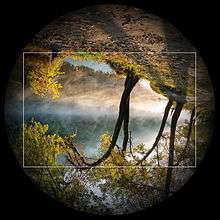Image circle
The image circle is the cross section of the cone of light transmitted by a lens or series of lenses onto the image plane. When this light strikes a perpendicular target such as photographic film or a digital camera sensor, it forms a circle of light – the image circle. Various sensor aspect ratios may be used which all fit inside the same image circle, 3:2, 4:3, 16:9, etc.

A lens to be used on a camera that provides movements must have an image circle larger than the size of the image format (Adams 1980, 54). To avoid vignetting, a photographer using a view camera must ensure that the area remains within the image circle (Adams 1980, 56–57; 151–52; 157–61); a tilt/shift lens or perspective-control lens used on a small- or medium-format camera usually has mechanical limitations that keep the frame area within the image circle.
See also
- Film format
- Image sensor format
- Format factor
References
- Adams, Ansel. 1980. The Camera. The New Ansel Adams Basic Photography Series/Book 1. ed. Robert Baker. Boston: New York Graphic Society. ISBN 0-8212-1092-0
- Ray, Sidney F. 2000. The geometry of image formation. In The Manual of Photography: Photographic and Digital Imaging, 9th ed. Ed. Ralph E. Jacobson, Sidney F. Ray, Geoffrey G. Atteridge, and Norman R. Axford. Oxford: Focal Press. ISBN 0-240-51574-9
- Ray, Sidney F. 2002. Applied Photographic Optics, 3rd ed. Oxford: Focal Press ISBN 0-240-51540-4
Further reading
- Langford, Michael J. Basic Photography, 3rd ed, 63–64. Garden City, NY: Amphoto, 1973. ISBN 0-8174-0640-9
- Ray, Sidney F. Photographic Lenses and Optics, 125. Oxford: Focal Press, 1994. ISBN 0-240-51387-8
- Stroebel, Leslie. View Camera Technique, 3rd ed, 62–67. London: Focal Press, 1976. ISBN 0-240-50901-3